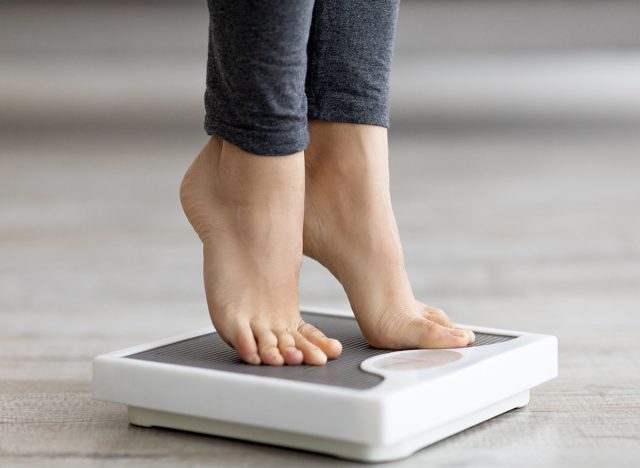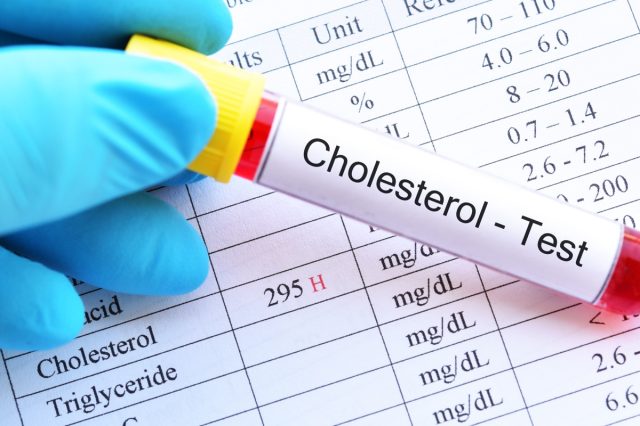Lose 20 Pounds in 60 Days with Intermittent Fasting

Losing 20 pounds in 60 days can be achieved, depending on your starting weight—and intermittent fasting could be a very useful tool to help make that happen. "Fasting changes where your body gets its energy. Typically, your energy comes from sugar. If you eat constantly while awake and don't exercise, your body simply runs on the calories you consume," says UCLA Health. "If you don't use all the sugar you take in during the day, your body stores it as fat. When you go hours without eating, your body eventually runs out of stored sugar to use. Instead, it begins to burn fat to produce energy." Here's how intermittent fasting can help with weight loss and overall health.
Pick a Fasting Window

Your fasting window is how long you fast for, and your eating window is the time allotted for meals. "There are lots of options to choose from," Mary Hyer, RD, LDN, CCRP, tells Mass General Brigham. "But in the scientific world, you have to go at least 12 hours for it to be considered a fast. You still have to make sure you're picking healthy foods. But intermittent fasting is one tool that can kickstart a healthy lifestyle change."
Ease Into It

You might find it easier to ease into fasting by changing some other behaviors first. "If fasting sounds scary, try to avoid snacking between meals and especially late-night snacking," Hyer says. "That can be an easy way to give yourself time for your blood sugar to recover between meals."
What Can I Drink?

Try not to take in any calories during your fasting period. "While there are no hard-and-fast rules regarding what you can consume during your unrestricted eating periods, experts agree that maintaining a healthy, well-rounded diet produces the best results," says UCLA Health. "During fasting times, limit yourself to water and zero-calorie drinks."
Eating Less

The shorter your eating window, the less you are likely to eat. "If you maintain your regular diet and then limit the time window during which you eat, it is likely that you will eat a few hundred fewer calories per day," Richard Joseph, MD, tells Harvard Health. "If this is sustainable as a lifestyle, it could add up to modest weight loss (3% to 8% on average, based on current data) that can produce beneficial improvements in cardiometabolic markers such as blood pressure, LDL cholesterol and triglyceride levels, and average blood sugar."
Stay Active

You can lose lean muscle as well as fat with intermittent fasting, so make sure to support muscle growth through exercise. "Given the importance of lean muscle mass for revving your metabolic rate, regulating your blood sugar, and keeping you physically able overall, pairing resistance training with an intermittent fasting protocol is strongly advised," Richard Joseph, MD, tells Harvard Health.
RELATED: I Lost 120 Pounds in a Year by Walking. Here's How Many Steps You Need to Do to Lose.
No Snacking

Intermittent fasting can prevent mindless snacking, which causes weight gain. "Take a moment to think about your eating habits," Melinda Gong, RD CDCES CSOWM, tells UC Davis Health. "If you notice that you tend to snack a lot at night, intermittent fasting could give you a cut-off time and help you eat less. If you notice your last meal of the day is late in the evening, maybe you can eat earlier to allow your body to start fasting at that time."
Health Benefits

Intermittent fasting has benefits beyond weight loss. "Losing weight and being physically active help lower your risk of obesity-related diseases, such as diabetes, sleep apnea and some types of cancer," Manpreet Mundi, MD, tells the Mayo Clinic. "For these diseases, intermittent fasting seems to be about as beneficial as any other type of diet that reduces overall calories."
Long-Term Weight Loss

A study from the University of Illinois Chicago shows intermittent fasting can lead to long-term weight loss. "That is pretty exciting," Courtney Peterson, a professor of nutrition at the University of Alabama at Birmingham, tells NPR. "This study has the most compelling results suggesting that people can stick with it, that it's not a fad diet in the sense that people can do it for three months and they fall off the wagon for a year."
RELATED: 10 Simple Ways To Lose Weight for Women Over 50
Portion Control and Calories

Remember, portion control and calories still count for weight loss with intermittent fasting. "During your eating window, focus on eating a healthy diet and maintaining portion control. Don't eat too many calories and avoid junk food and fast food," says Family Doctor. "While you don't need to eat anything in particular, you do need to make sure you're getting the nutrition you need. Some people choose to use the Mediterranean diet as a guideline for what to eat. This plan focuses on fruits, vegetables, beans, whole grains, and fish. You can also choose lean proteins and healthy fats."
Stay the Course!

Don't be discouraged by unpleasant symptoms as your body adjusts to the new way of eating. "It may take 2 to 4 weeks for your body to get used to eating on an intermittent fasting schedule. During those first few weeks, you may have headaches and feel hungry, grouchy, or tired," says Family Doctor. "Know you may feel this way before you start and make a plan to push through these feelings. After a few weeks, your body will get used to this eating pattern and those symptoms should go away. In the end, many people say that feel better following an intermittent fasting lifestyle."
Lower Bad Cholesterol

Experts say intermittent fasting can positively impact cholesterol and some cancers. "If you add exercise to the mix, it's a great combination for not only weight loss but also improved health benefits," says Family Doctor. "Intermittent fasting may help people who have cardiovascular disease, neurological disorders, and some cancers. Intermittent fasting may also help lower your bad cholesterol and improve symptoms of arthritis."
RELATED: 20 Powerful Methods to Achieve Your Best Body Ever
Who Shouldn't Fast?

Always talk to your doctor before starting any drastic dietary change. "Intermittent fasting is safe for many people, but it's not for everyone," Dr. Mundi says. "Skipping meals may not be the best way to manage your weight if you're pregnant or breast-feeding. If you have kidney stones, gastroesophageal reflux, diabetes, or other medical problems, talk with your doctor before starting intermittent fasting." And if you enjoyed this article, take advantage of these 15 Quick Ways to Lose Body Fat Percentage in a Week.




